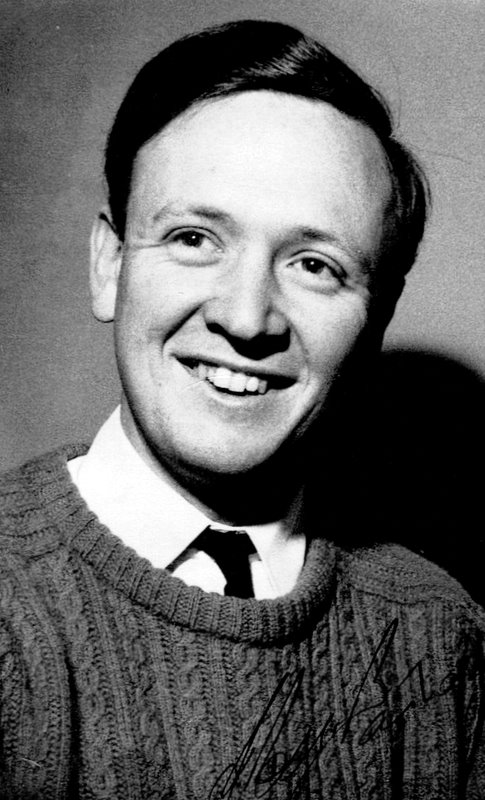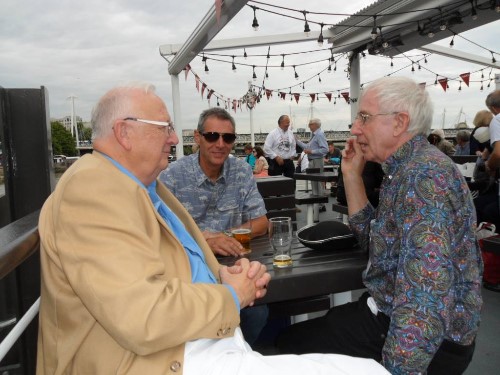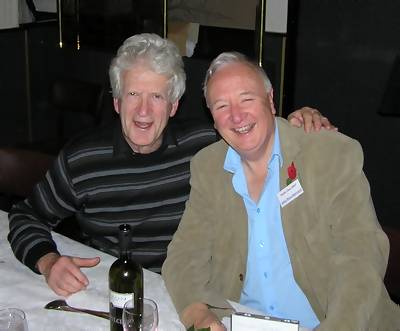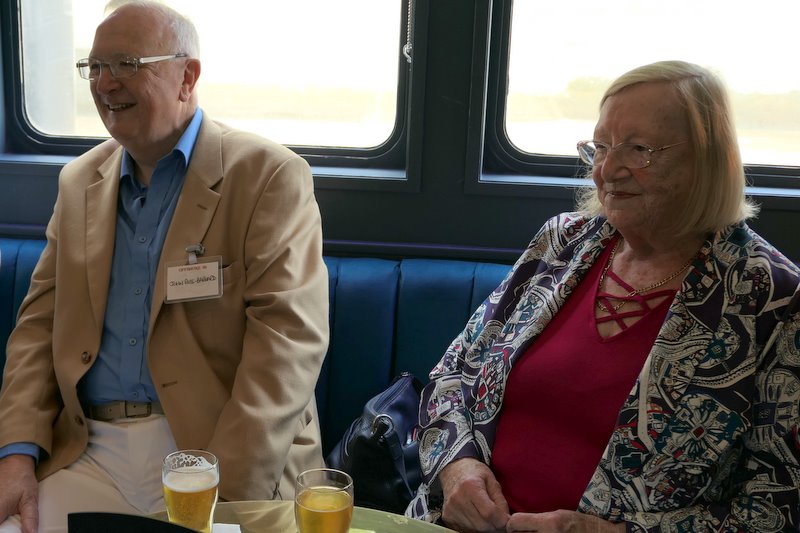|

|
|
John Ross-Barnard. An autographed photo sent to your webmaster in 1965 when John was working for King Radio.
|
People became pirate DJs for all sorts of reasons but John Ross-Barnard, who has died at the age of 83, may have been unique. He went to sea because he wanted to be a BBC newsreader.
With his mellifluous voice and public school education, courtesy of Wellington College, one would have thought he would have been perfect for the job but when he applied to the Corporation in 1963 he was turned down flat. Writing
about it in Keith Skues's book ‘Pop Went the Pirates’ John recalled: “I think it is worth putting on the record that
if you wanted to work in radio, way back in 1963, there were only two places to go, the BBC or BFBS, the British Forces Broadcasting Service .... I wanted - ached even - to be a broadcaster. I was an early version of the
‘anorak’ even if I lacked the duffel bag, bad breath and two luminous pens in the top pocket, the visible signs of a fully paid-up radio enthusiast ... I wrote to BBC Appointments Department, then known as BBC
Establishment. Back came the pre-printed reply: ‘No experience, no job.’ But where was the only place to get radio experience in the UK? Answer: The BBC.”
As John has mentioned, there was one other place one could broadcast: BFBS. He applied, was auditioned and was offered a job. The one catch - it was in Aden, then going through a particularly violent period. John was married
with a young family and, with that responsibility weighing heavily, he declined the position.
|

|
|
One of John's own photos, shared on Facebook. He is on the left, Mark Wesley in the middle, and Roger Day on the right at ‘Offshore 50’.
|
In 1964 Radio Caroline was launched. The station didn't have a news service at that time. John applied anyway but was turned down. Then one fateful day later that year he was sitting at home in Barnet, north London,
when he heard another offshore station, Radio Invicta. This sweet music outlet broadcast from Red Sands fort off the Kent coast. While he was listening the company secretary's address was mentioned on air.
John immediately drove round there and rang the doorbell. The company secretary, David Lye, listened to John's audition tape and offered him a job, starting the following week. It was great news but the timing was not ideal.
John wrote: “I went to Whitstable to pick up the fishing boat. Invicta didn't have a big posh tender like Radio Caroline. I met Bruce Holland, also a newcomer, waiting on the quay. The fishing
boat used as a tender had been due to arrive the night before ... but didn't. Sadly a DJ, an engineer and the manager, Tom Pepper, together with his fishing boat, were lost at sea. Did the news of three deaths in the name of radio
put a dent in my determination? Too right it did! Bruce and I went to the pub ... It's amazing what a couple of large brandies will do for your confidence. ‘We'll give it a go’ we said.”
John and Bruce arrived to join a shell-shocked team on Red Sands. They had just lost their boss and two close colleagues. But the shows had to go on. Invicta was not a large organisation but it liked to give
the impression that it was. To assist this illusion each DJ broadcast under more than one name. John was JRB, Larry Pannell, Pete Ross and Peter Barraclough (pronounced “Barclay”). But despite their hard work, the
station did not survive much longer. Its transmitter was only capable of putting out a fairly weak signal, there was very little advertising and, with a lack of direction following the death of the boss, the end was
perhaps inevitable.
Fortunately fresh investors were found, a bigger transmitter installed and a new station, King Radio, launched in March 1965. It featured a number of the same presenters, including John.
 John Ross-Barnard presenting Melody Hour on King Radio, a studio recording kindly provided by John's colleague Mark Hammerton. (duration 1 minute 46 seconds)
John Ross-Barnard presenting Melody Hour on King Radio, a studio recording kindly provided by John's colleague Mark Hammerton. (duration 1 minute 46 seconds)
But King was no more successful than its predecessor. David Lye sought advice on what could be done. One of the people he consulted was Ted Allbeury, an advertising executive turned
PR man. He suggested that King should be replaced by a much higher powered station, aimed at the same housewife audience but presented with greater professionalism. Lye agreed and Allbeury came on board as Managing Director. A new company
was formed, finances were raised and most of the old King directors bought out. Facilities were improved, a much more powerful transmitter and proper aerial mast were purchased, better studios constructed and in September
1965 King Radio made way for a new operation, Radio 390. And John was still there - his third station in less than a year.
John wrote: “We changed the wavelength again, this time to 390 metres in the medium wave band where we were required to announce ‘Radio 390 presents Eve, the Women's Magazine of the Air.’ Ted (Allbeury) had seen
that radio was going towards the American model and smartly marched Radio 390 back to the Light Programme of 1946. We had Tea Time Tunes; we had Evening Serenade; we had Masters of the Organ - I never did master
it incidentally, and we closed down at 6.00pm with Goodnight Ladies. Having closed down we then smartly reopened with The World Tomorrow with Garner Ted
Armstrong, a right wing evangelist whose job it was to prognosticate on the state of the world and invite listeners to send money so that he could go on prognosticating about the state of the world. The programme was the biggest
money raiser that 390 ever had!”
 John reading horoscopes on Radio 390's ‘You and the Stars’ programme. Recording from the CD ‘The Things You've Never Heard Before Volume 1’, compiled by Hans Knot and kindly provided by Martyn Webster
(duration 1 minute 24 seconds)
John reading horoscopes on Radio 390's ‘You and the Stars’ programme. Recording from the CD ‘The Things You've Never Heard Before Volume 1’, compiled by Hans Knot and kindly provided by Martyn Webster
(duration 1 minute 24 seconds)
 John presenting the afternoon ‘Spotlight’ programme in which the music of one artist was played. This show from May 1966 featured Val Doonican. Recording courtesy of www.azanorak.com with thanks to Ray Robinson (duration 1 minute 45 seconds)
John presenting the afternoon ‘Spotlight’ programme in which the music of one artist was played. This show from May 1966 featured Val Doonican. Recording courtesy of www.azanorak.com with thanks to Ray Robinson (duration 1 minute 45 seconds)
Radio 390 might have been old-fashioned but it quickly found an audience. After the failures of Invicta and King, this was a major improvement. The new station's strong signal and professional programmes
won a large and loyal listenership throughout the south of England. The directors even wanted to expand into the north. John wrote: “Sheldon (Jay) arrived one day with the news that Radio 390 was going to be duplicated. A
sister-service would start from a ship to be anchored next to Radio Caroline North a few miles from Douglas, Isle of Man. We were instructed to record every programme, remove all time checks and delete any comments which would
indicate a day and date. We were not to comment on the music but limit our contribution simply to ‘here is’ and ‘that was’ ... We were incensed! What little verbal creativity we were allowed we had guarded
jealously, and now this. The announcers to a man were an anarchic lot anyway and, foolishly, I allowed myself to be their mouth-piece. We asked, very calmly, that, in view of the extra exposure we would give, we should have a pay rise.
Pay was £28 per week and we dared to ask for £30. Sheldon, ever the gentleman, said he would consult the management. The shift changed and I left the forts for a week's leave. Little did I know that it would be
forever.”
|

|
|
Britain Radio colleagues reunited at the 2007 Radio Day in Amsterdam. Phil Martin, left, and John Ross-Barnard.
|
Ted Allbeury was incensed that one of the presenters had had the audacity to ask for a £2 pay rise. John was fired with immediate effect. It was time to look for a new job. Radio Caroline now had a news service,
run by Graham Webb. John paid a visit to Caroline House and Graham immediately offered him a position as newsreader with a salary of £30 a week, the amount that had just got him fired from Radio 390.
Unfortunately the vacancy wouldn't become available for another month. John decided to call in at 32 Curzon Street, just round the corner from Caroline House. This was the home of Britain Radio/Swinging Radio England,
two American-owned stations which broadcast from the same ship. He met Britain Radio's Programme Director Phil Martin. Britain Radio was an easy-listening station and its presenters also read the news
on Radio England, the fast moving Top 40 service. John wrote: “Phil heard my (audition) tape and offered me £40 per week to start the following day. What to do, what to do? I walked back to Caroline House, no more
than fifty yards away. Graham Webb heard my tale. ‘John,’ he said, ‘You'd be a fool to turn it down.’ (Station boss) Don Pierson is one of the nicest guys in the business and he knows more about offshore
radio than anyone.”
John had a new job - hosting a show on Britain Radio and reading the news for the ‘boss jocks’ on Radio England, where he also acquired a new nickname: John Boss Farmyard!
 John reading a news bulletin on the Boom Boom Brannigan Show on Swinging Radio England, 16th October 1966. Reporting on the violence in Aden must have made John very grateful that he had declined the
posting there with BFBS. This recording kindly provided by Svenn Martinsen (duration 1 minute 34 seconds)
John reading a news bulletin on the Boom Boom Brannigan Show on Swinging Radio England, 16th October 1966. Reporting on the violence in Aden must have made John very grateful that he had declined the
posting there with BFBS. This recording kindly provided by Svenn Martinsen (duration 1 minute 34 seconds)
Graham Webb might have been correct when he said that Don Pierson knew a lot about offshore radio but, as an American in Britain, maybe Don didn't understand British tastes because his two stations did not do well.
Both had their fans but it soon became apparent that there weren't enough of them or sufficient advertising revenue. Stories began to circulate that one of the services might have to close. John again: “Because of the
rumours (of closure) I had redoubled my efforts to join the BBC. I wrote letters, sent audition tapes, but heard nothing. But fate was to take a hand. Dave Cash, then on Radio London, sent me to see his
agent, Chris Peers. Chris had contacts in BBC TV. He got me an audition in BBC Presentation. I wrote scripts, recorded announcements, read a news script. I read in the style of BBC1, short and precise and in the style of BBC2 rambling
but worthy ... I was offered a month's trial contract with BBC Television. There was just time to return to the Laissez-Faire for my concluding stint on board. On the last day with Britain Radio I gave a few clues that it would be
the final show in my offshore radio career. I played For All We Know We May Never Meet Again, Bye Bye Blues, the Peter Cook and Dudley Moore classic Goodbye-ee and finally my lifelong signature tune Happy Days
Are Here Again by Jack Teagarden. If anyone noticed this odd collection of titles being broadcast they didn't comment. Probably because on the same day the company dropped another bombshell for those on board - Radio England
would be transferred to a Dutch service in one month. Swinging Radio England was to stop swinging.”
After nearly two years at sea, it was the end of John's pirate career, but not the end of his time in broadcasting. At the BBC he worked in presentation for five years, was Head of Foreign Recordings then Head of BBC Video. In 1984
he became chief executive of Coventry Cable followed by a five year spell as CEO of Satellite Media Services, distributing programmes and commercials around the independent commercial radio stations which by now had opened in Britain.
He was a consultant, was assigned to a Peace Initiative in Bosnia and was a Justice of the Peace. But he never forgot his time as a pirate and was a welcome guest at the various offshore radio reunions. He even put his head-phones
back on for some re-creations of Radio London doing - what else? His first love, reading the news.
John was active on social media, keeping in touch with former listeners and colleagues on Facebook, always signing off each post with “happy daze!”
|

|
|
John and his wife Connie at ‘Offshore 50’. Photo by Martin van der Ven.
|
His many friends were shocked when, on 31st October 2022, Tristan Ross-Barnard posted: “I am extremely sad writing this. I am the grandson of John Ross-Barnard a former pirate radio and BBC broadcaster and
would like to let his friends know that he is receiving end of life care at Coventry University Hospital due to a kidney infection taking a turn for the worst. If all that have worked with him, been a friend or acquaintance of his
could you say a prayer that he pulls through. He really is a hero of mine and our family.” Sadly the prayers were not enough and John passed away on 2nd November. His grandson shared the news on Facebook:
“I am heartbroken. I didn't ever think I'd be writing this. Unfortunately John Ross-Barnard my Grandpa has passed away this afternoon. He was an incredible man with an incredible career that I idolised and looked up to
since I can remember. So can everybody raise a glass and toast to the incredible life of John Ross-Barnard. I spent as much time as I possibly could with him from the moment he took a turn in hospital and cherished every moment.
Happy Daze Grandpa. I am going to miss you forever.”
Other tributes to John Ross-Barnard can be found on the Radio London and
Offshore Echos websites.
|

